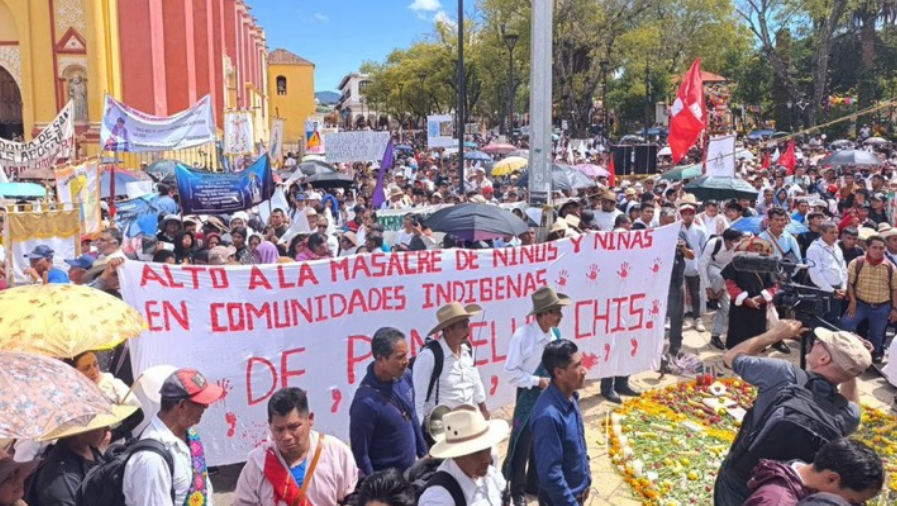
We have been hearing this phrase for years in EZLN communiqués and in the words of Zapatista women. Now it appears in a video by Xun Sero in homage to Father Marcelo. The war against the peoples and the complicit indifference of the powers that be is the context in which this affirmation of collective dignity is pronounced.
In February 2013, in one of the communiqués of the series Them and Us, it can be read: We are ready for anything and we are not afraid. In the call for the first International Meeting of Women In Struggle, in December 2017, the question of fear appears prominently: But in any case we are not afraid, or we are, but we control it, and we do not surrender, and we do not sell out and we do not give in.
On many other occasions the EZLN has addressed this issue, even pointing out that beyond the number of people who resist and do not surrender, not being afraid has become a sign of the movement’s identity. Alone, Father Marcelo repeated the concept, adding: We are not afraid, never again. I am not clear if his preaching has any echo in the diocese of San Cristobal de las Casas, but apparently a part of its faithful would follow that orientation as could be seen in the days after his assassination.
In the revolutionary traditions the theme of fear has appeared on rare occasions. I remember some of Che Guevara’s phrases and little else. Perhaps because recognizing that fear does not fit in organizations that were considered vanguard and most probably because the dominant patriarchal culture would not be willing to accept fear as something natural in human collectives from below, persecuted and harassed by the powerful. I would like to address some issues from the practice of rebel movements.
The first is that the statement we are not afraid is in the plural, collective, not individual. Being part of revolutionary peoples and organizations allows us to work on fears from another place. It means recognizing fear without denying it, working to limit it or have it under control, not in the way of psychoanalysis but in the way of community practices that involve listening to the elders, looking inward and looking around. Fear is not the same in the city as in the mountains and jungles, because the dialogue with life places us in another place.
The second is related to the vanguard. I do not remember that in the militancy we discussed fears in meetings, before or after any action, although it is evident that fears were present. My fears were about torture, whether I would be able to resist it. But something prevented us from recognizing it and talking about it, and I think it is the fact that we believed we were superior, new men. Stalin already said it in the homage to Lenin: We communists are men of a special mettle. We are made of a special fabric (On the occasion of Lenin’s death, Selected Works, 1953).
On the contrary, those who make up the EZLN always seemed to me to be common people, but self-taught, educated by the organization and by the history of the peoples, with such depth that they are capable of dedicating their best energies to the collective construction of a new world. I never felt that they considered themselves special, or superior, but on the contrary, as part of peoples and communities that work with simplicity and patience with their fellow humans. They speak little and do much.
The third is that saying we are not afraid is part of collective self-affirmation, of determination and steadfastness to be what they are while accepting all the consequences. It is not a challenge to the powerful, to armies and bad governments, but the consequence of a very consistent collective inner work, which allows us to ensure not to be afraid from the collective conviction and confidence.
The fact of not being afraid is the inner and communitarian strength that allows us to face the storms, in particular the violence from above, keeping calm and resolute orientation. Because it is in difficult situations such as the current ones that organization and firmness at the helm are most necessary. But to achieve this, it is indispensable to overcome fear.
The history of revolutionary processes is plagued with brilliant programs and manifestos that become a dead letter when storms rage, because in those moments the most comfortable paths are taken, but not those that had been previously decided. The crisis of European social democracy when the war of 1914 broke out is a good example of how the fear of losing what had been accumulated generates deviations that lead to departing from the path taken.
I think we should reflect on the phrase we are not afraid. Behind those three words there must be a very powerful collective work, which is what allows organizations to move forward even when everything is against them and when the majorities surrender to the powerful.
Original text by Raúl Zibechi published in La Jornada on November 1st, 2024.
Translation by Schools for Chiapas.